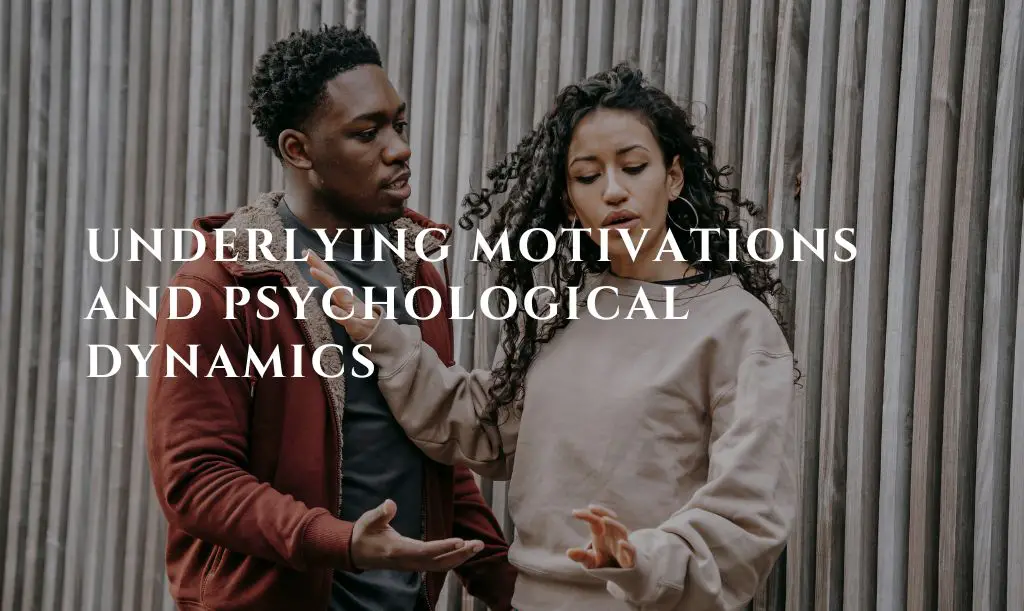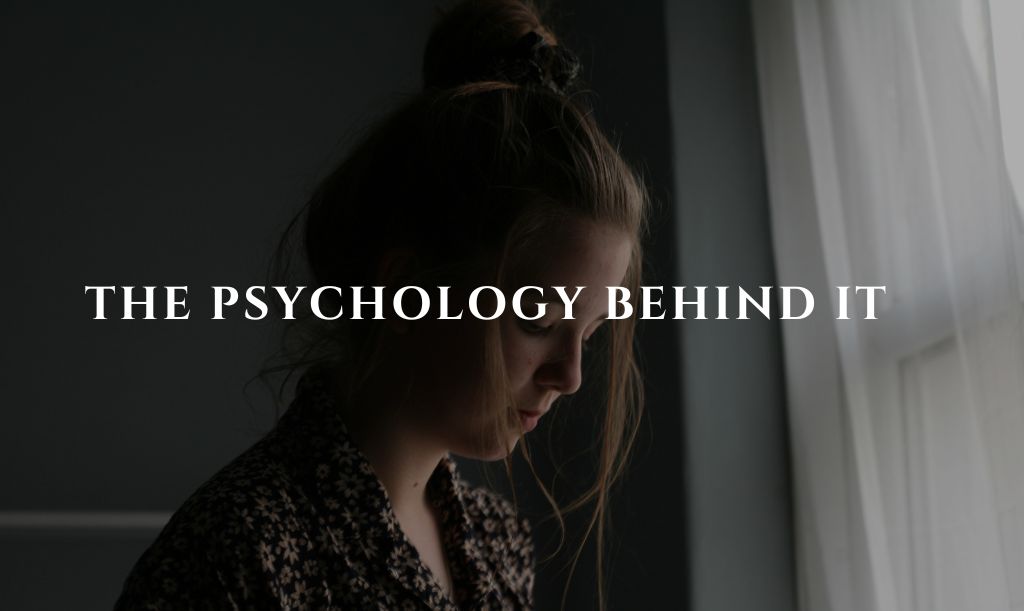Now here’s a conundrum that has puzzled poets and philosophers for centuries: why do we find ourselves being mean to those whom we secretly adore?
It seems absurd at first glance – how can cruelty coexist with affection?
But let me assure you, this perplexing paradox is more common than you may think.
Imagine you have a crush on someone who makes your heart flutter like a fragile butterfly.
Yet instead of showering them with kindness and compliments as tradition dictates, you adopt an entirely different approach – one that involves teasing remarks or sarcastic jabs.
It’s as if your mind plays tricks on your emotions!
But fear not; there is indeed method to this madness.
Exploring The Underlying Motivations And Psychological Dynamics

To unravel the enigma behind being mean to your crush requires delving into the depths of our subconscious minds.
You see, there is often an unconscious motive lurking beneath these seemingly spiteful actions.
One possible explanation lies in our fear of vulnerability.
When we develop feelings for someone, we expose ourselves to the possibility of rejection and heartbreak.
To protect our fragile hearts, we instinctively erect walls.
Being mean becomes a defense mechanism, an armor that shields us from potential pain.
Furthermore, this peculiar behavior can also be seen as a means of establishing control in an uncertain situation.
By being mean or teasing our crushes, we assert power over the dynamics of the relationship.
It gives us a sense of authority and safeguards us from feeling too emotionally invested.
Why Am I Mean To My Crush? Understanding the Paradox
In the tumultuous realm of romantic emotions, one finds themselves trapped in a perplexing paradox: feeling drawn to someone while simultaneously employing defense mechanisms to shield themselves from potential heartache.
It is a tightrope walk between desire and self-protection, where the allure of companionship clashes with the instinctual need for self-preservation.
This intricate dance reveals itself through seemingly contradictory behaviors, leaving both parties bewildered and questioning their actions.
Fear Of Vulnerability: Protecting Oneself From Potential Rejection Or Heartbreak
At the core of this enigma lies an undeniable fear of vulnerability.
We are afraid to lay bare our true emotions, exposing ourselves to the possibility of rejection or heartbreak.
It is easier to be mean or distant towards our crushes than to open up and risk emotional devastation.
By erecting walls around our hearts, we create a false sense of security, shielding ourselves from potential pain but also hindering any chance at genuine connection.
Guarding One’s Emotions: Establishing A Sense Of Control In An Uncertain Situation
Furthermore, being mean to our crushes allows us to establish a semblance of control amidst the uncertainty that accompanies romantic entanglements.
The rollercoaster ride of emotions can be overwhelming, leaving us feeling disoriented and powerless.
By adopting an attitude of aloofness or even rudeness towards our crushes, we regain some semblance of control by dictating the terms and pacing of interaction.
In effect, it becomes a defensive mechanism that shields us from being swept away by love’s unpredictable currents.
It is crucial to recognize that while these defense mechanisms may offer temporary relief from vulnerability and uncertainty, they also impede genuine connection and hinder personal growth.
By understanding this paradoxical behavior within ourselves and others, we can take steps towards overcoming our fears and embracing the potential for love and meaningful relationships.
Why Am I Mean To My Crush? The Psychology Behind It

Freud’s theories may be controversial, but they offer intriguing insights into the complexities of human behavior.
When it comes to being mean to your crush, Freud’s defense mechanisms come into play like unruly actors on a chaotic stage.
Displacement is at the forefront – where we redirect our emotions onto someone or something else.
By being mean to our crushes, we might be unconsciously channeling our frustrations and fears from other aspects of our lives.
It’s much easier to project our anger or insecurities onto someone who triggers strong emotions within us than confront those feelings head-on.
Then there’s projection – a bitter pill to swallow!
This defense mechanism involves attributing one’s own undesirable qualities onto others.
When we’re mean to our crushes, it could be because deep down inside, we feel unworthy or inadequate in their presence.
By projecting these feelings onto them and making them appear flawed or undeserving of affection, we protect ourselves from facing our own vulnerabilities.
And let’s not overlook denial!
Denial shields us from uncomfortable truths by simply pretending they don’t exist.
In this case, perhaps being mean is a way for us to deny that we actually have feelings for our crushes in the first place.
It’s easier to mask these emotions behind a facade of indifference and hostility rather than admit that they hold power over us.
Attachment Theory: Fearful-Avoidant Attachment Style and Its Impact on Behavior
Attachment theory provides another lens through which we can analyze why being mean manifests in interactions with our crushes.
Within this theory lies an attachment style known as fearful-avoidant.
Those with this attachment style possess a deep-rooted fear of both intimacy and rejection.
When we adopt a fearful-avoidant attachment style, our behavior towards our crushes can become perplexingly contradictory.
On one hand, we desire closeness and connection; on the other hand, we fear the potential pain of rejection or abandonment.
These conflicting emotions manifest as being mean or distant as a way to protect ourselves from potential heartbreak.
It is important to recognize that attachment styles are shaped by our early experiences and relationships.
If we have experienced inconsistent caregiving or emotional unavailability during childhood, it can profoundly impact how we navigate intimate connections later in life.
The fear and avoidance that manifest in our interactions with crushes may stem from a deep-seated survival instinct developed in response to past relational wounds.
The Art of Teasing and Flirting

It may seem counterintuitive to be mean to someone you have feelings for, but let me assure you, it is all part of a complex courtship ritual.
Playful banter serves as an intricate form of testing compatibility, where two individuals engage in lighthearted verbal sparring to gauge each other’s wit and resilience.
This teasing becomes a battleground where minds clash, creating sparks that ignite chemistry like no other.
It is a rite of passage; an unspoken initiation into the hidden realms of attraction.
Why do we resort to this primal behavior?
Evolutionary psychology offers us valuable insights into our baffling inclination towards teasing as a form of courtship ritual.
It harks back to our ancestors, the cavemen and cavewomen who engaged in playful banter to assess potential mates’ genetic fitness and social intelligence.
In those ancient times, teasing was nature’s way of revealing hidden depths beneath the surface.
The ability to trade light-hearted jabs was indicative of intellectual acumen and emotional strength – traits desired for survival and successful procreation.
Why Am I Mean To My Crush?: Subtle Power Dynamics at Play in Teasing Interactions
Within the realms of teasing lies an intricate tapestry woven with delicate power dynamics.
Yes, behind those seemingly innocuous jabs lie subtle shifts in dominance and submission.
The artful tease allows both parties involved to assert their individuality while simultaneously navigating the underlying power play involved in romantic pursuits.
Each witty retort becomes an attempt at asserting oneself, revealing glimpses of confidence and poise.
It is a dance of give and take, where both individuals aim to establish their place in this intricate social tangle called courtship.
The intriguing world of teasing and flirting goes far beyond surface-level insults or provocation.
It is a complex interplay of emotions, desires, and subconscious drives rooted deep within our evolutionary past.
Past Experiences Shaping Present Behavior
Our childhood experiences leave an indelible mark on our lives, and it’s no different when it comes to matters of the heart.
The way we navigate relationships as adults is heavily influenced by the relationships we witnessed and experienced during our formative years.
If we grew up in a household where love was scarce or conditional, it can create a deep-seated fear of intimacy and vulnerability.
This fear can manifest itself as being mean to our crushes – a defense mechanism to protect ourselves from potential heartbreak.
Impact Of Early Relationships With Caregivers On Trust And Intimacy Issues
Our first interactions with love come in the form of our relationship with our caregivers.
This primary bond sets the foundation for how we perceive trust and intimacy later in life.
If these early relationships were marked by inconsistency or neglect, it can deeply impact how we approach romantic connections.
Trust becomes a fragile concept that feels elusive and unattainable.
We may question the intentions of others, doubting their sincerity and fearing betrayal.
In response to this deep-seated fear, being mean to our crushes allows us to maintain a sense of control over our vulnerable emotions.
Role Models Shaping Perception Of Love And Romantic Interactions
From fairy tales to Hollywood romances, popular culture inundates us with images of idealized love stories that rarely reflect reality.
Our perception of love is often shaped by these external influences, leading us to have unrealistic expectations or distorted views on what healthy relationships should look like.
If we grow up idolizing toxic portrayals of romance or witnessing dysfunctional dynamics in those around us, it’s no wonder that being mean becomes a misguided attempt to replicate what we’ve learned.
We may mistakenly believe that love is supposed to be tumultuous or that being mean is a way to gain attention or provoke a desired reaction.
Our past experiences have a profound impact on our present behavior towards crushes.
Childhood experiences shape how we approach intimacy, with early relationships influencing our ability to trust and connect with others.
Additionally, societal and cultural influences can distort our perception of love and romantic interactions.
While being mean to a crush may be rooted in self-protection or misguided attempts at emulating what we’ve seen, it’s crucial to recognize these patterns and strive for healthier ways of navigating relationships.
Only by understanding the origins of such behavior can we begin the journey towards authentic connections based on trust, respect, and vulnerability.
The Path to Self-Reflection

In our quest for self-improvement and emotional growth, it is crucial to embark upon a journey of self-reflection.
Recognizing our own behavior patterns and acknowledging the reasons behind them is the first step towards understanding why we may be mean to our crush.
It requires introspection and a willingness to delve into the depths of our subconscious mind.
By stepping back and objectively observing our actions, we can start unraveling the tangled threads that have led us down this perplexing path.
Why Am I Mean To My Crush: Conclusion
So, why am I mean to my crush?
Well, being mean to your crush is not an indication of some inherent flaw within you.
It is a complex interplay of emotions, defense mechanisms, past experiences, cultural influences, and even playful teasing.
While it may feel frustrating or confusing at times, remember that navigating matters of the heart has never been an exact science.
Embrace the opportunity for self-reflection and growth that these experiences offer.
Learn from them, experiment with different approaches in expressing your feelings, and above all else, be kind to yourself throughout this process.
By shedding light on these intricacies surrounding being mean to your crush, I hope I have provided you with insight and comfort in knowing that you are not alone in this enigmatic dance of emotions.
Remember that relationships are as unique as the individuals involved in them.
Embrace vulnerability with caution but also with an open heart.
Trust yourself to navigate these uncharted waters while staying true to who you are.
Let your experiences shape your understanding of love rather than confine you within predetermined notions or societal expectations.
And always remember: amidst the confusion lies the potential for genuine connection and profound growth.
Related Articles:
- https://lovebridgeguides.com/when-a-guy-shortens-your-name/
- https://lovebridgeguides.com/when-your-man-calls-another-woman-beautiful/
- Does A Prom Date Mean Anything? (Answered!) - 20 February 2024
- Boyfriend Refers To Me In Third Person (Explained!) - 20 February 2024
- Is Sending Memes Flirting? Find Out Here! - 20 February 2024

